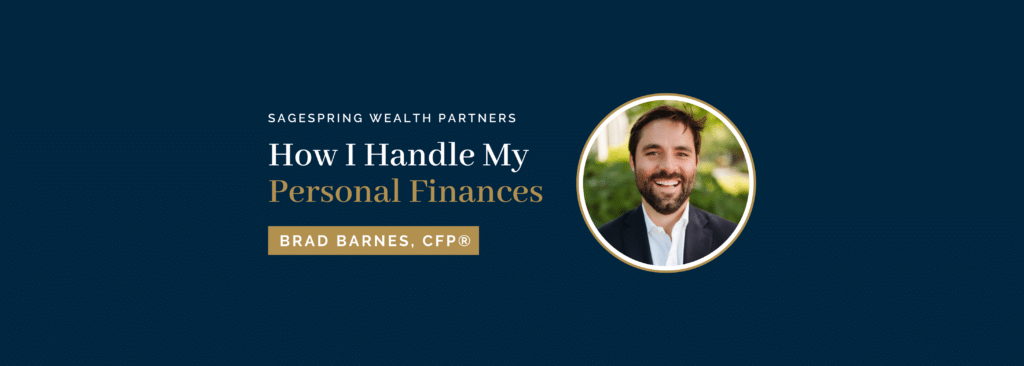If you’ve ever worked with a financial advisor, you know how important it is to have someone keeping you accountable for your money goals. Having a trained advisor’s insight and wisdom on your personal finances can be an invaluable resource. But have you ever wondered what the personal finances of an advisor look like? Just like a dentist needs to visit their own dentist and a doctor needs to see their own doctor, the same is true for a financial advisor. They too need someone to provide an outside perspective on their financial decisions and hold them accountable to their money goals.
Brad Barnes, Executive Vice President of SageSpring Wealth Partners and leader of the Barnes Wealth team knows just how important it is to have accountability when making financial decisions. Today, he’s giving us an inside look at how he manages his own personal finances. His outlook and values surrounding how he handles money may just surprise you.
“Money is just a tool that gets you to where you want to go.”
I didn’t grow up around a lot of money. As the son of a pastor and a math teacher, my family didn’t have a lot of extra money. Yet, I was never left wanting either. While I didn’t grow up wealthy, my parents helped me to grow up with a healthy view of how to handle money. Instead of living with a scarcity mindset, I was taught to view money in a different way. I learned growing up that money can be a very valuable tool that helps get you to where you want to go. Also, growing up the way I did, I learned that money isn’t the answer to everything.
From the moment I started making income, my dad taught me to begin tithing and giving. He (my dad) was very intentional about giving. That intention helped set the course and frame money in a different manner for me. I believe that money is God’s and I’m just a steward of it. God is always going to provide.
“Giving helps me keep money in its proper place.”
Generosity is a means to getting free from the fear that surrounds money. When you face your money fears head-on (and in every area of your life), you’re able to keep money in its rightful place. When you reframe money in a healthy way, you begin to view your role as manager and steward rather than owner. That changes your posture from closed-fisted to open-handed.
My vision of success for myself and those I have the opportunity to advise is to disentangle the fear and love of money and reframe generosity as the metric of success.
My Top Five Values For Handling My Personal Finances
In terms of my personal finances, there are five values that I consistently prioritize and refer to. I share these values with my clients and I look forward to passing them down to my son, who is due to arrive this December. These values are central to my financial philosophy and guide my decision-making.
1. Live below your means.
When you live below your means, you’re able to be generous, pursue your life goals, and gain the benefit of better peace of mind, which is hard to put a value on.
2. Give.
You can’t out-give God. I once asked my mom if by 10%, God meant my “gross” or “net” income. Her response has stuck with me forever. She said, “How much do you want to be blessed?” Giving is more about how you posture yourself. It’s much better to give rather than receive.
3. Take big purchases seriously.
Ask yourself, “Can I afford the big things I want and live the life I want to live?” Your answer to that can be helpful when making decisions on things like cars, homes, and other investments.
4. Know what you value.
If you were to give someone a bank statement, they could tell what you value by where you spend your money. Knowing what you value is key because your dollars should reflect your values rather than the other way around.
5. Ask for help.
Even financial advisors have financial advisors. I can get too close to my money. It can be too personal for me, so I get help from people I trust. We all need help—We’re not always a good guide for ourselves. You need someone to help keep you on your path.
Financial planning isn’t just about knowing how to handle your money. It’s about acting on it too. It doesn’t help to just have the knowledge about finances. You have to act on your finances too. Oftentimes, there’s a clear path, but some of it is about having the discipline of doing it along the way.
That’s why it’s so beneficial to work with a financial advisor. They help keep you on the path you should be on. You can’t just know the right stuff, you’ve got to do the right stuff. And the hardest part is in the doing. If you’re ready to invite someone into your personal finances, my team would love to help. Reach out here, or find a trusted SageSpring Wealth partner in your area. We can’t wait to help you on your money journey.

